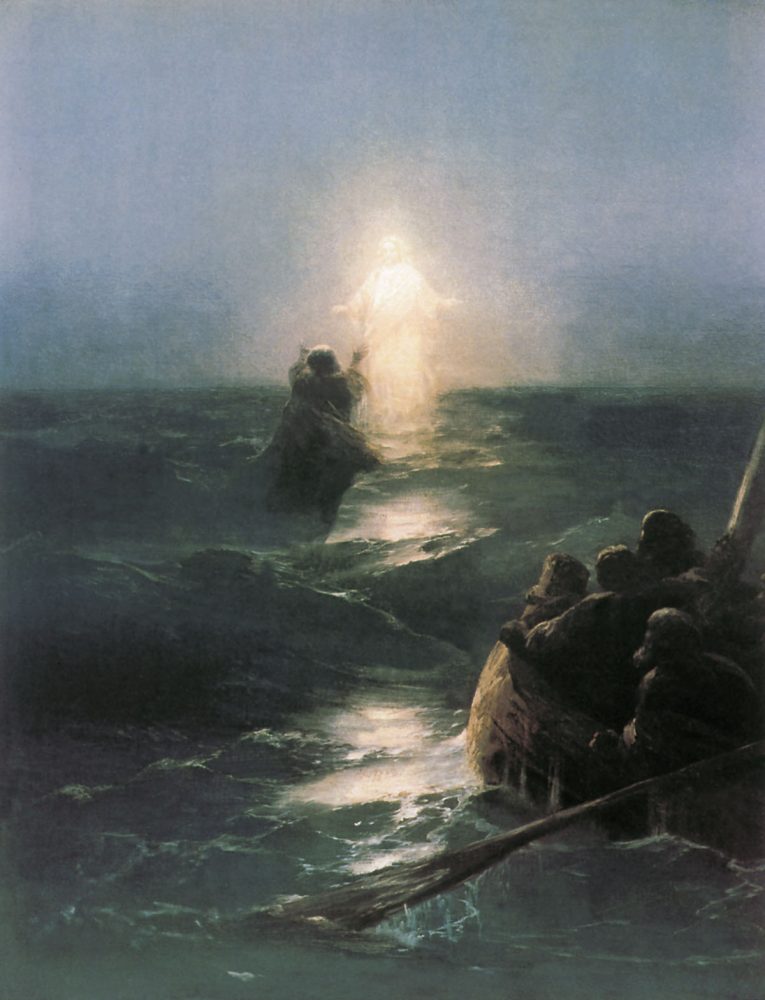Fr Paolo Consonni, MCCJ
“Peter got out of the boat, started walking on the water, and came toward Jesus. But when he noticed the strong wind, he became frightened, and beginning to sink, he cried out, “Lord, save me!” Jesus immediately reached out his hand and caught him, saying to him, “You of little faith, why did you doubt?” (Mt 14:29-31)
The news these days is reporting the devastating flood in Beijing, which left at least 20 people dead and still many missing. The damage was catastrophic. This era, in which climate change has had such a profound impact on the planet, it is not surprising to read about devastating events which are happening all over the world. No one can feel safe anymore. A few days ago, in my hometown in Italy a hailstorm damaged roofs, cars and everything else outdoors. The hailstones were as big as oranges, something never seen before. Gratefully, there were no casualties. Sudden storms are indeed an increasing part of our reality.
The people of Israel were always afraid of large bodies of water, which in their minds symbolized the uncontrollable forces of the unknown. And the ultimate unknown is death itself. No wonder the disciples seemed a bit reluctant to embark on crossing the lake that night, and Jesus had to “compel” them. Some of them were experienced fishermen, and they knew the risks involved in the night crossing. This Sunday’s Gospel (Matthew 14:22-33) vividly describes how we all react when life’s storms hit.
First of all, we all feel abandoned by God. The absence of Jesus, who “went up the mountain by himself to pray” (v. 23), truly represents the condition of the Church after Jesus’ Ascension. We do not feel Jesus with our senses, but nonetheless, we are called to believe in His power over death and the other “unknowns” and trust in His providential presence.
The small boat of the disciples, which symbolizes the Church, is a structure that is not meant for safety and comfort. It should be a stepping stone that allows us to make personal faith choices, especially in critical times which can feel like walking on water. As human beings, entrusting ourselves does not come very naturally to us.
Last May, we Comboni Missionaries gathered in Manila for meetings. On the last day, we took a day off and enjoyed some time on a beach not far from the capital. I tried to convince a brother who does not know how to swim to try and float face up, reassuring him that if he relaxed totally, the water could bear his weight. In spite of the fact that I was supporting him, he couldn’t relax enough: too many waves kept breaking on his face, making his breathing difficult. We had to give up. While the theory is correct, the practice is far more complicated: we simply cannot control the motion of the sea, and this is also true in our lives. We do not always encounter smooth waters and favourable wind in our life’s journey following Jesus, and it is unrealistic to expect that we can do so.
That is why Peter’s stepping out of the boat, in spite of the winds and the waves, is admirable: he knew what he was getting into. Like him, we are called to take a personal leap of faith many times during our life span. For instance, when we realize our marriage needs major adjustments. Or when, after taking our vows, we start experiencing the difficulties of community life. A friend of mine is delivering her first child today, and in asking for prayers, her fear was truly palpable. Or when we get a worrying medical report from our doctor. There are moments in life in which we suddenly have no control, and we feel like we are sinking.
The point is, faith is not the absence of fear. Even Jesus was scared and in anguish in the garden before being arrested. Fear is a feeling; faith is a choice. Faith is being aware of the wind and waves, as well as the fragility of our circumstances while keeping our eyes fixed on Jesus and oriented toward Him. When sinking, faith is to recognize our inability to cope by ourselves, and cry to Him: “Lord, save me!” Even when we are scared, faith is to keep acting on what we understand is the right thing to do and trust that we are not alone in those troubled waters.
Doubts and fear accompany faith, more than denying it. They show us that we are all “people of little faith,” and probably it is a good thing to keep it like that. Looking at Peter’s life we see very clearly that overconfidence and a heavy, self-centered ego is more dangerous and likely to sink you than fear. Humility is a better lifesaver in facing our life’s storms.


 Follow
Follow


